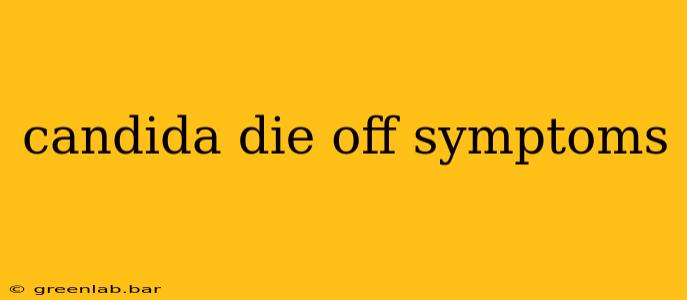Candida albicans is a fungus naturally present in the human body. However, an overgrowth, often referred to as candidiasis, can lead to a range of symptoms. When treatments like antifungal medications or dietary changes begin to kill off the Candida, a phenomenon known as a die-off reaction or Herxheimer reaction can occur. This isn't a side effect of the treatment itself, but rather a reaction to the toxins released by the dying yeast. Understanding the symptoms of Candida die-off is crucial for successful treatment and managing potential discomfort.
Understanding the Herxheimer Reaction
The Herxheimer reaction is a common occurrence when treating infections, particularly those caused by microorganisms like bacteria, parasites, and fungi. As these pathogens die, they release toxins into the bloodstream. This sudden influx of toxins can trigger a variety of symptoms, often worsening before improving. The intensity and duration of the Herxheimer reaction vary widely depending on the individual, the extent of the infection, and the chosen treatment. It's essential to remember that while uncomfortable, the Herxheimer reaction is generally a sign that the treatment is working.
Common Candida Die-Off Symptoms
The symptoms of Candida die-off can mimic many other illnesses, making diagnosis challenging. They can range from mild to severe and often fluctuate in intensity. Some of the most common symptoms include:
Gastrointestinal Issues:
- Headache: Often one of the first symptoms to appear, headaches can range from mild to severe.
- Fatigue: Extreme tiredness and exhaustion are very common, often worsening throughout the day.
- Nausea and Vomiting: Feeling sick to the stomach and experiencing vomiting can be significant symptoms.
- Bloating and Gas: Increased abdominal bloating and gas production are common due to the release of toxins.
- Diarrhea or Constipation: Changes in bowel movements are frequent, ranging from diarrhea to constipation.
- Stomach Cramps and Pain: Abdominal pain and cramping are common digestive disturbances.
Neurological Symptoms:
- Brain Fog: Difficulty concentrating, remembering things, and feeling mentally cloudy.
- Mood Swings: Experiencing irritability, anxiety, depression, or other mood changes.
- Insomnia: Difficulty falling asleep or staying asleep.
- Muscle Aches and Pains: General body aches and muscle pain.
Other Potential Symptoms:
- Skin Rashes: Itching, redness, or other skin irritations can occur.
- Joint Pain: Inflammation and pain in the joints are possible.
- Fever and Chills: A low-grade fever or chills can develop.
- Increased Sensitivity to Light or Sound: Heightened sensitivity to external stimuli is possible.
- Worsening of Existing Conditions: Pre-existing conditions may temporarily worsen.
Differentiating Candida Die-off from other Conditions
It's crucial to note that many of these symptoms are non-specific and can be indicative of other medical conditions. Therefore, it's vital to consult a healthcare professional for proper diagnosis and treatment. Self-diagnosing and treating Candida can be dangerous. A doctor can perform tests to confirm the presence of Candida overgrowth and rule out other potential causes of your symptoms.
Managing Candida Die-Off Symptoms
While the Herxheimer reaction is generally a positive sign, managing the symptoms can significantly improve comfort and compliance with treatment. Here are some strategies to help alleviate discomfort:
- Hydration: Drink plenty of water to help flush out toxins.
- Rest: Get plenty of rest to support your body's healing process.
- Gentle Exercise: Light exercise, such as walking, can help improve circulation and detoxification.
- Support from a Healthcare Professional: A healthcare professional can provide guidance on managing symptoms and adjusting treatment as needed.
- Dietary Adjustments: Following a Candida-friendly diet can help reduce symptoms. This often involves limiting sugars and processed foods.
Disclaimer: This information is for educational purposes only and should not be considered medical advice. Always consult with a qualified healthcare professional before starting any treatment for Candida or any other medical condition. They can help you determine the best course of action based on your individual needs and medical history.

